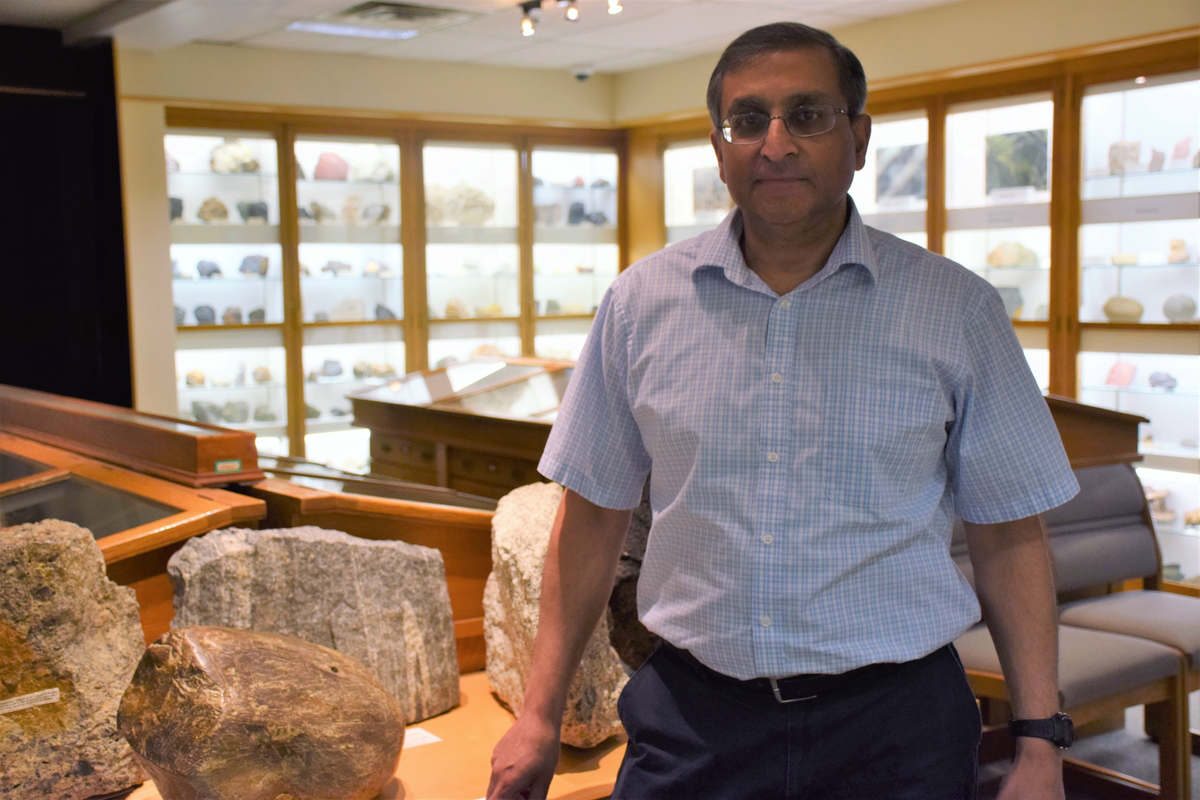
Meet Thomas Chacko, our November 2018 Instructor of the Month and associate chair in the Department of Earth and Atmospheric Sciences. Photo credit: Michaela Ream
What do you teach?
The main undergraduate course I've taught for many years is called Metamorphic Petrology It's the study of metamorphic rock, examined through field, petrographic, and geochemical data. It's one of the required courses in the third year of the students program, so it's basically their first in-detail exposure to metamorphic rocks.
What's the most interesting thing about this subject area?
One is the logical nature of it-that you can start in first principles and build your way up to see how things piece things together. One of the things I try to sell to the students is although the course is specifically about metamorphic rocks, the techniques and principles that you learn are transferable to other areas of geology as well. So it's sort of a mindset or a method to how to approach rocks and that's quite transferable-and transferable skills are always the most powerful kind of skills.
What was your favourite learning experience as an undergrad and how do you incorporate that experience into teaching your students?
I don't know if I can point to just one, but I think all of us can point to teachers that made a difference. I've always said the best way to learn how to teach is just think back to your own experience of a good teacher you had and say: what did they do that was effective with you? And usually, if it was effective with you it might be effective with other people as well-so just imitate.
What was it that drew you to this field?
I'm unusual. Most people who go into geology don't come to university and say 'I'm going to go into geology.' They usually come in looking for something to major in and they take a first year geology course and then they get interested, and that's how they get into it. My experience was different, for reasons that I still can't explain, in fourth grade we had a mineral collection project and so I went into my backyard and started collecting stuff and my parents got me a little book and I just found it fascinating and I can't explain why, and ever since then I've said I'm going to be a geologist.
Why sort of things can rock formation tell you?
All the inner planets in our solar system, from Mercury to Mars, are rocky planets. As you go further out in the solar system they are basically big ice balls of condensed gases, but for the rocky planets, Earth is the only one that has lots of rocks that make up our continents. So the rocks of continents have different composition than the rocks of oceans and that's a reason continents are above sea level because they're less dense-sort of like ice. Maybe you want to look at it that way, sort of like an iceberg floating so the top part floats above sea level and that has all kinds of difference. If there weren't continents around, our planet wouldn't be livable. The fact that rocks are above sea level is part of what regulates surface temperatures.
One of our research questions has been: why does the earth have continents whereas these other planets don't, and how did continents start to form? Continental rocks start to form early in the planet's history-has that changed through time? So, we've got to go back to the record of the earliest continents and studying this rock gave some insights into how that process happened back then and is it still going on today or not.
You are this year's recipient for the Graduate Student Mentorship Award. What is the most common piece of advice or guidance that you give to your students?
In some ways it's similar to the undergraduate teaching. It comes from personal relationships and actually caring about the students as people, and that you actually want them to learn and that they're not a burden.
The most important thing we do as academics-we don't always realize it but the most important thing we do-is training other people. That's our longest-lasting contribution to society, the investment we put into both our undergraduate students and graduate students.
"Caring about the students as people and actually investing in them and knowing them; that's the most important thing we do." -Thomas Chacko
The research that we do is important and is great, but it has a shelf life that isn't, for the most part, all that long. The investment that we put in those students, that's a much longer return on your investment. Caring about the students as people and actually investing in them and knowing them; that's the most important thing we do.
What is one thing that people would be surprised to know about you?
When I finished my undergraduate I had no designs on being an academic or teaching. In fact the whole prospect absolutely terrified me. I hate getting up in front of audiences and so on, but it was my first experience as a teaching assistant as a master's student that I was shocked that I liked doing that. Particularly, the one-on-one interactions where you can look a student in the eye and they get it. It was such a rush. I wasn't expecting that and that's what sort of changed my trajectory and what I wanted to do as a career. To this day, and particularly when I started teaching, I've always been shocked that my teaching has been well-received because it has never felt like it was something natural to me.